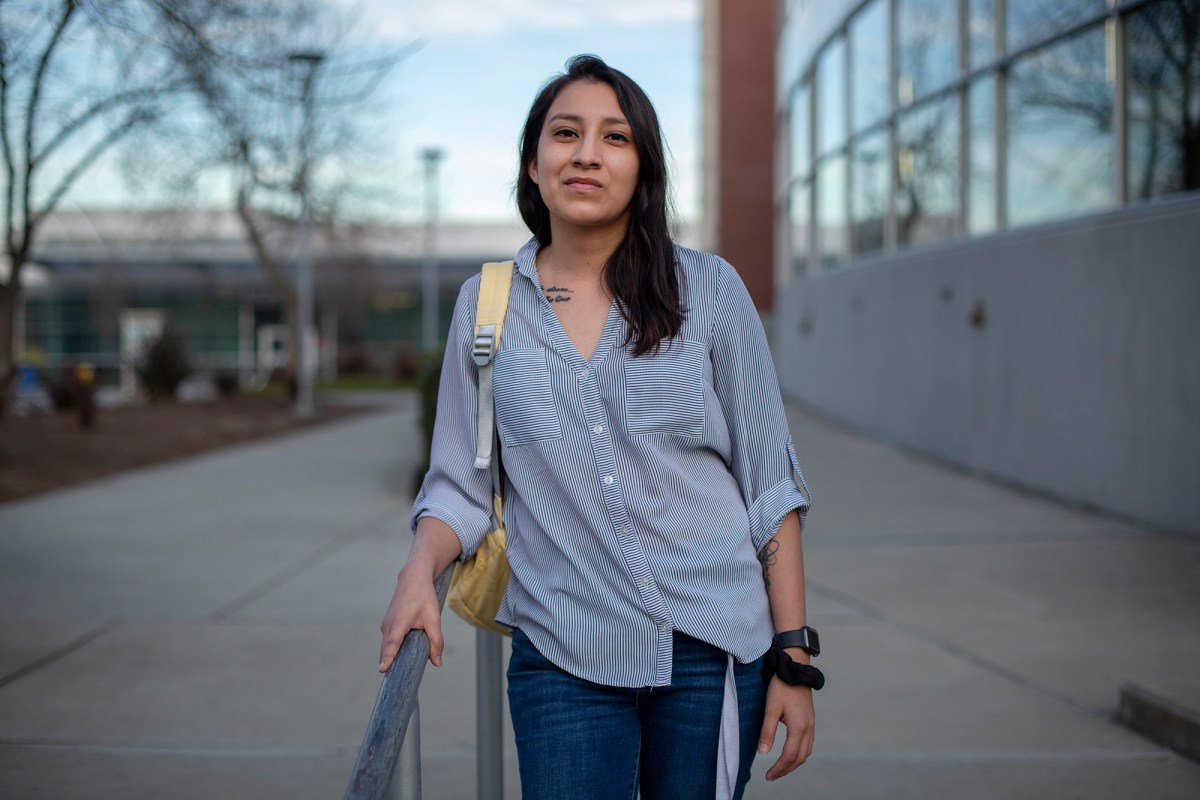When I first started at Stanford this fall as a first-generation college student, I automatically felt a sense of immense pressure. I felt a need to prove that I deserved my spot — especially as I looked at my peers, many of whom came from affluent backgrounds and already had impressive internships lined up for the summer and national awards listed on their LinkedIn profiles.
Feeling out of place didn’t go away when I arrived on campus. Move-in weekend, I was surrounded by other freshmen whose parents had attended Stanford and could show them around. That wasn’t the case for me — both of my parents are immigrants from Mexico. My mom, who never got to finish high school, and my dad, who didn’t get past middle school, were in awe of the place I would be residing in for the next four years.
As the school year got underway, I struggled with feelings of burnout while pushing myself academically. I signed up for an ambitious 18-unit course load in the fall, compared to the typical 14-unit freshman load. I piled on extracurricular activities, including the school newspaper, Stanford Women in Politics, and a fellowship at the CalMatters College Journalism Network. This quarter, I challenged myself further by enrolling in Math 19, Stanford’s introductory calculus course.
But I quickly saw gaps in my learning. The material I had learned in my under-resourced high school did not prepare me for college-level math.
I ultimately opted for a credit/no credit score for the class instead of a letter grade, a decision that was very difficult.
I know I’m not the only first-generation student to struggle without the support of family members who have attended college.
At Stanford, 18.5% of the Class of 2023 is first-generation. About 41% of undergraduates in the University of California system and nearly one-third of California State University students are the first in their families to attend college. And COVID-19 has made it a difficult year for all students.
For the CalMatters College Journalism Network, I set out to talk to other first-generation students on California campuses about what it was like adapting to academia — and what they wish other people understood about the first-gen experience. (Comments have been edited for length and clarity.)
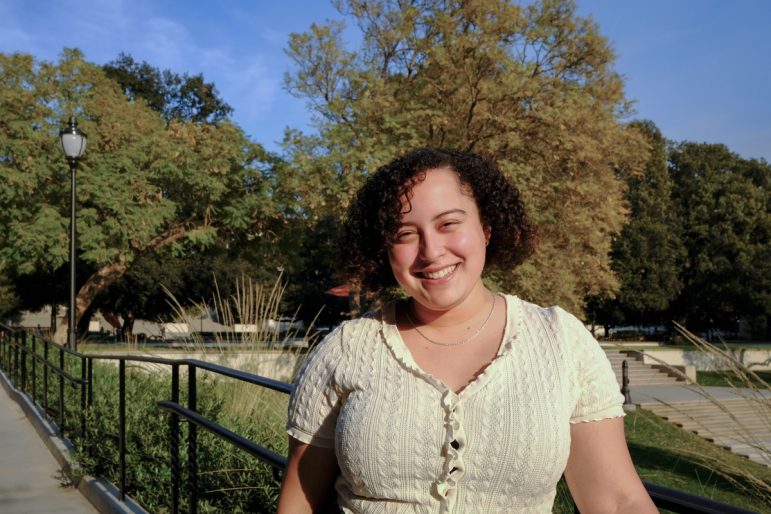
Perla Duran – Occidental College
Freshman Economics & Media, Arts, and Culture major; Chinese minor
First-generation college students have a lot of determination and drive. And that’s what I think people need to understand more.
They’ve seen their families go through so much. My mom came from the Dominican Republic and had to work job after job.
The good thing about being a first-generation college student is you have the drive to keep finding more resources. But I think what people think is that we’re just confused, and that we don’t know anything.
I experienced this in high school. I was looking into journalism programs because I was really interested in journalism. I was too scared that I wasn’t going to be able to get into a program like the Princeton Summer Journalism Program (PSJP), but I decided to go for it anyway. PSJP was really amazing because we were able to interact with different journalists. We were assigned a counselor who was able to help me with (college) applications. I would recommend first-generation students do any similar program out there.
When it came to me applying to a private school, especially applying early decision, it was really hard for me, because my school counselor was telling me, “Oh, you might not get enough aid, and you’re gonna have to go to that school and not gonna be able to afford it.” But my counselor from PSJP was telling me “You’ll be able to afford it. The school meets full need.”
I didn’t really know who to listen to. I’m glad I listened to my PSJP counselor. Because if not, I would have (gone to) a state school that would have given me no money.
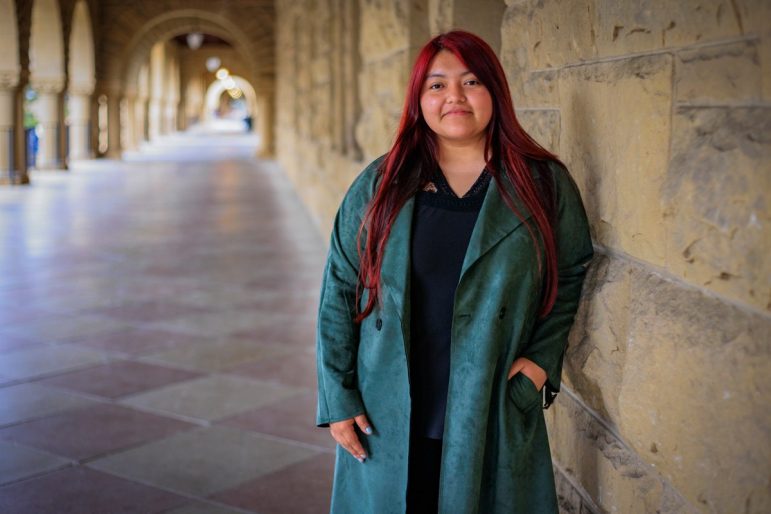
Ximena Sanchez Martinez – Stanford University
Junior Biology & Comparative Studies in Race and Ethnicity major
(Getting into Stanford) was a very exciting moment for me because (when I was growing up) my parents worked at the Coffee House on campus. When they couldn’t find a babysitter for me and my sister, they would bring us to work. I didn’t know English that well at first, so I remember I was trying to raise funds for a high school field trip by selling those little dollar chocolates. I remember setting it up here and someone helping me translate my little sign, and then Stanford students were buying my chocolate.
Now, coming here, of course, I’m older, I speak English. My parents couldn’t help me with the application process but when I got into Stanford, they knew exactly where everything was. My mom was like “OK, this is where your chemistry class is supposed to be, your math class is going to be here, but you have to take this door to get in.”
Coming to campus, the aspect that I was most afraid of was just finding my friends, my friend group. It was an overwhelming experience. On the (anonymous messaging app) Fizz, there was a comment I saw once about first-generation, low-income students always pushing this perspective that they are victimized. There’s a lot to unpack in that.
When I saw it, I just wondered what made this person feel the need to make that comment. When people say things that are disrespectful to someone else, it’s because they don’t understand the full story.
I would encourage this person to come to one of our community-building events, just so that they get to learn more about this community on campus.
My freshman year, I initially joined the First Generation Low Income Partnership as an intern and now I am the co-president of the organization. On Thanksgiving, we do programming for students who were unable to go back home during the week. We got funds to buy a bunch of goodies and students could come by, pick up a bag, and shop around for things. I want them to know that there are people on campus who care about their wellbeing and that they belong here.
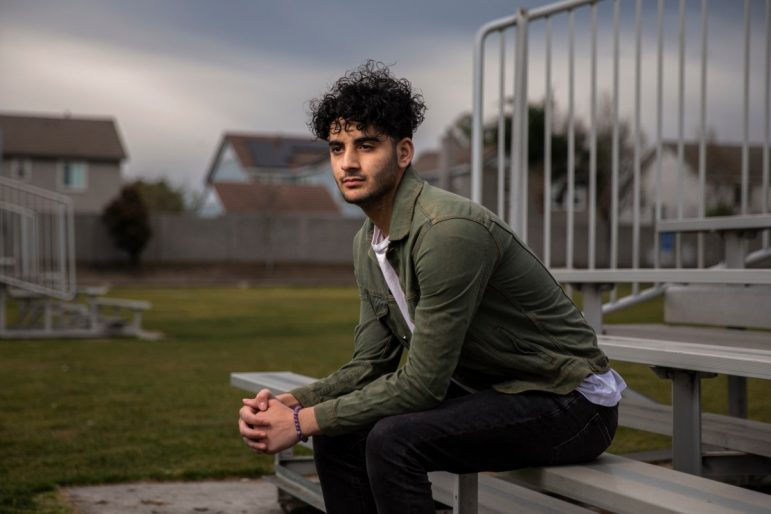
Aziz Ayobi – Las Positas College
Sophomore Nursing Major
There’s this assumption that (first-generation students) are gonna follow the footsteps of their parents. They’re just like, “Oh your parents didn’t go to college, then you’re pretty much the same as them.” Now that I’ve started college, I feel like I have this duty to actually finish college. It’s like a responsibility that I have to take care of.
Going straight to a four-year sounded really scary. Starting off at a community college made it way better. It lessened the tension a lot. Now, when I go to a four-year, I know what’s going on, what I should be expecting, and what they should be expecting from me.
(I had) no guidance from parents. (First-generation students) literally don’t know what to expect. It’s like a fog; they’re walking blindly through something. I really didn’t want to go to college but my teachers pushed me.
This was different water that I was treading so at first, I was very scared. Then, as time went on, I really thought about it and it was actually exciting. I’m actually starting to like it; I chose the correct decision.
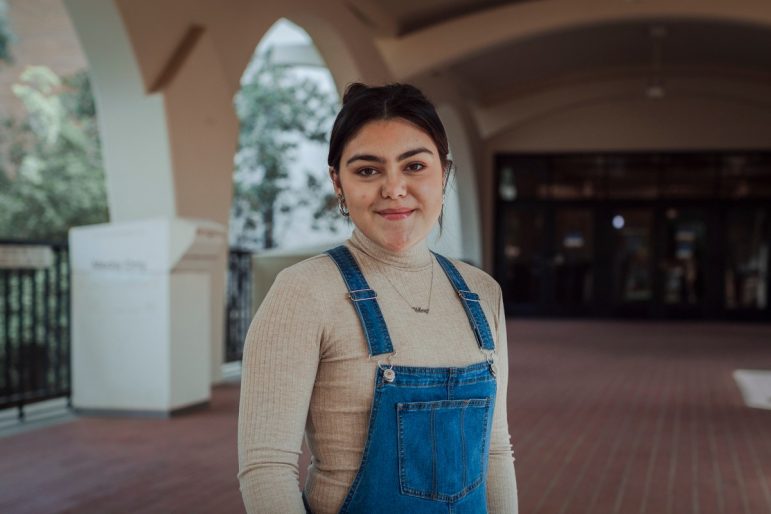
Valery Barrera – University of California, Riverside
Freshman Creative Writing Major
I knew since middle school that I was going to be a first-generation student going to college. In middle school, I said, “Mom, do you have a trust fund for me? Do you have something for college?” And she said, “No, I don’t.” I had a bunch of other friends whose parents did have a bank account set aside for their kids.
For the most part, I’ve always gotten good grades and I think that that’s how I’ve always portrayed myself to other people. That’s just the expectation they have for me. Being a first-generation student, they don’t know how hard college can be — how overwhelming it can be — because they’ve never had that experience.
Something people misunderstand about being first-gen is this assumption that “Oh, you’re really smart because you got into this college, so you know what you’re doing, you know how to handle it.” But in reality, we really don’t know what we’re doing.
They think you know how to sign up for (the federal financial aid application) FAFSA by yourself. They expect you to be able to handle all of these responsibilities.
Every time a family friend sees me, they’re like, “Oh, how’s college? How are you doing?” And obviously, my answer is always gonna be “Yes, I’m doing OK.” But in reality, there’s always struggle, and I feel like that’s something people don’t really think of.
I come home every weekend, and almost every weekend, I have homework. I’m just stuck in my room doing homework and I feel so drained and so overwhelmed. Friends and family should understand this. I tell my mom all the time, “I’m just gonna go to Starbucks and do my homework,” because I just need a change in environment.
College is a big, big, big responsibility. And it takes a toll on your mental health. And I feel like that’s something we need to pay more attention to.
It’s important not to overwhelm yourself because at the end of the day, you’re doing what you love and you’re doing it for yourself. Reminding yourself that you’re doing this for you and that it’s going to benefit you in the best way possible, is important. Taking a deep breath is OK. Taking a step back is OK.
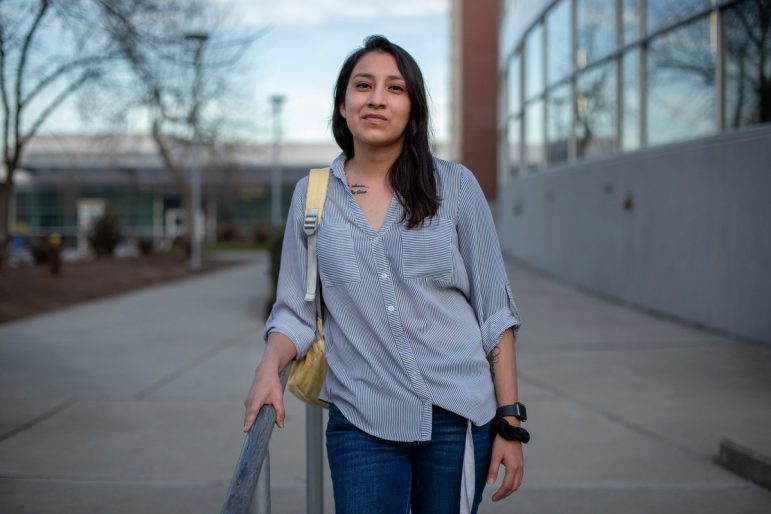
Jaqueline Ruvalcaba – American River College
Sophomore Journalism Major
I’ve been in and out of college for about five years because of work. The main problem has been having to decide whether I wanted to just stick to working because that’s what my parents did. When in reality, I want to go to school. I want to learn about people’s experiences and I want to enjoy what I do. I don’t think anyone should ever have to pick between those things.
My parents came here and they worked. They didn’t go to school, they didn’t think about school. They said, “If you can succeed in your job, you do that over anyone else.” You had to do it to get somewhere. That mentality definitely passes on.
I wish that people really understood that first-generation students sometimes start from scratch. How do you sign up for a class? How do you even go to college? I mean, do I just walk in and say, “Hey, I want to go to American River College?” That’s literally what I had to do to figure it out.
If I could give first-generation students advice, I would say it’s gonna get really hard at times. You’ll be tired, you’ll be exhausted, but get out there because we need people who came from that process to be a part of society and integrate themselves into different branches of society, and for certain branches, you have to go to school.
Luna is a fellow with the CalMatters College Journalism Network, a collaboration between CalMatters and student journalists from across California. This story and other higher education coverage are supported by the College Futures Foundation.
